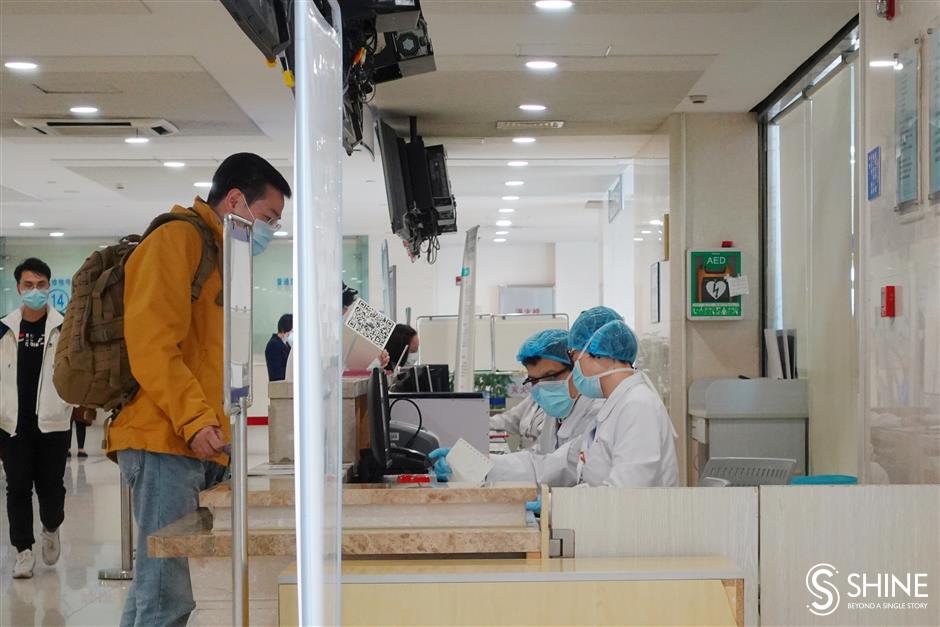
A man atRuijin Hospital in Shanghai.
Shanghai mapped out a raft of measures on Wednesday aimed at raising its ability to cope with major epidemics and public health emergencies to world-class level by 2025.
"An intelligent public health safety alarm mechanism will be built, and big data will be used to improve the city's ability in early screening and clinical prejudgment of infectious diseases," Vice MayorZongMing told a press conference on Wednesday.
"The layout of public health facilities will be improved, and construction of the hardware facility projects of city-level disease prevention and control institutions, testing laboratories, and emergency and scientific research platforms will be accelerated,"Zong said.
"Big data application in the public health field will be promoted, and Internet-related medical treatment will be developed.”
The city's assessment of public health safety risks based on different regions and different levels will be enhanced, she said.
The performance of officials in public health areas will be evaluated, and legislation and standard draft in public health fields accelerated.
Public health emergency storage centers will be established with a global procurement mechanism, emergency logistics service platform and fast transfer channel of items in short supply set up.
A comprehensive, intelligent and effective public health emergency command system and a highly sensitive and reliable public health monitoring and alarm system will be established.
A leading and advanced modern disease prevention and control system with the highlight of lifting the investigation, information analysis, testing and scientific research abilities of disease control and prevention institutions will also be built,Zong said.
"Intelligence and efficiency is key in the prevention and control system in response to big epidemic and public health emergency incidents for a metropolis such as Shanghai," saidZong.
"A think tank of public health experts will be established," she added.
"The infectious disease departments of hospitals in the city and the response ability to emergencies of community-based health service agencies will be improved," said WuJinglei, director of the city's health commission.
"Medical universities and collages are encouraged to expand the enrolment and scale of majors related to preventive medicine and infectious diseases," said Wu.
"The priority is majors regarding pathogenic organisms andbiosafety, big data and artificial intelligence application, health emergency management, disinfection and vector control, parasitic disease, food and sanitation, and psychology and mental health to support the development of infectious disease, respiratory, and emergency and critical disease departments of hospitals,” Wu said.
"The construction of laboratories and clinical medical research centers will be beefed up," he added.
"Authorities are mulling over developing infectious disease intelligent auxiliary diagnosis and treatment technology based on artificial intelligence and will develop an infectious disease index based on climate data to forecast infectious disease alarms," he said.
"Shanghai has a very efficient system from the discovery of patients with symptoms to quarantine, diagnosis, disease prevention and tracking," said ZhangWenhong, who heads a Shanghai medical team fighting the COVID-19 pandemic.
"The city has several thousand disease control and prevention staff and doctors to track these patients and quarantine their close contacts, which is important in the fast response in the disease prevention and control system and prevents the spread of the pandemic at communities," saidZhang.
"Failure in quick response to the pandemic and failure of rapid tracking, positioning and quarantine which leads to community spread is blamed in countries witnessing the outbreak without control," he said.
"Such public health incidents will certainly happen in the future. Therefore, we must keep a sensitive and strong system," he said.
"We have accumulated a lot of experience from the coronavirus, which will help us build a world-class public health system,"Zhangsaid. "The coronavirus pandemic enhances the city's infectious disease treatment system."
China established an infectious disease reporting system in 2004 and it now covers 39 diseases, saidFuChen, director of the city's disease prevention and control center.
"However, there are still some deficiencies in the monitoring sensitivity of new diseases with unknown sources," saidFu.
"As a mega city, Shanghai is confronted with more severe challenges in new imported diseases with unknown sources," he said.
"The city will improve its comprehensive monitoring system based on big data over syndrome, disease, hazardous factors, and lift its discovery and risk alarm abilities over new diseases with unknown sources," saidFu.
"Shanghai will keep promoting good hygiene habits and healthy lifestyle such as washing hands, good ventilation, and taking food from communal dishes with one set of chopsticks and spoons and another set to eat with after the pandemic," Wu said.
"Public health safety will be included in the education of middle and primary schools," he said.
